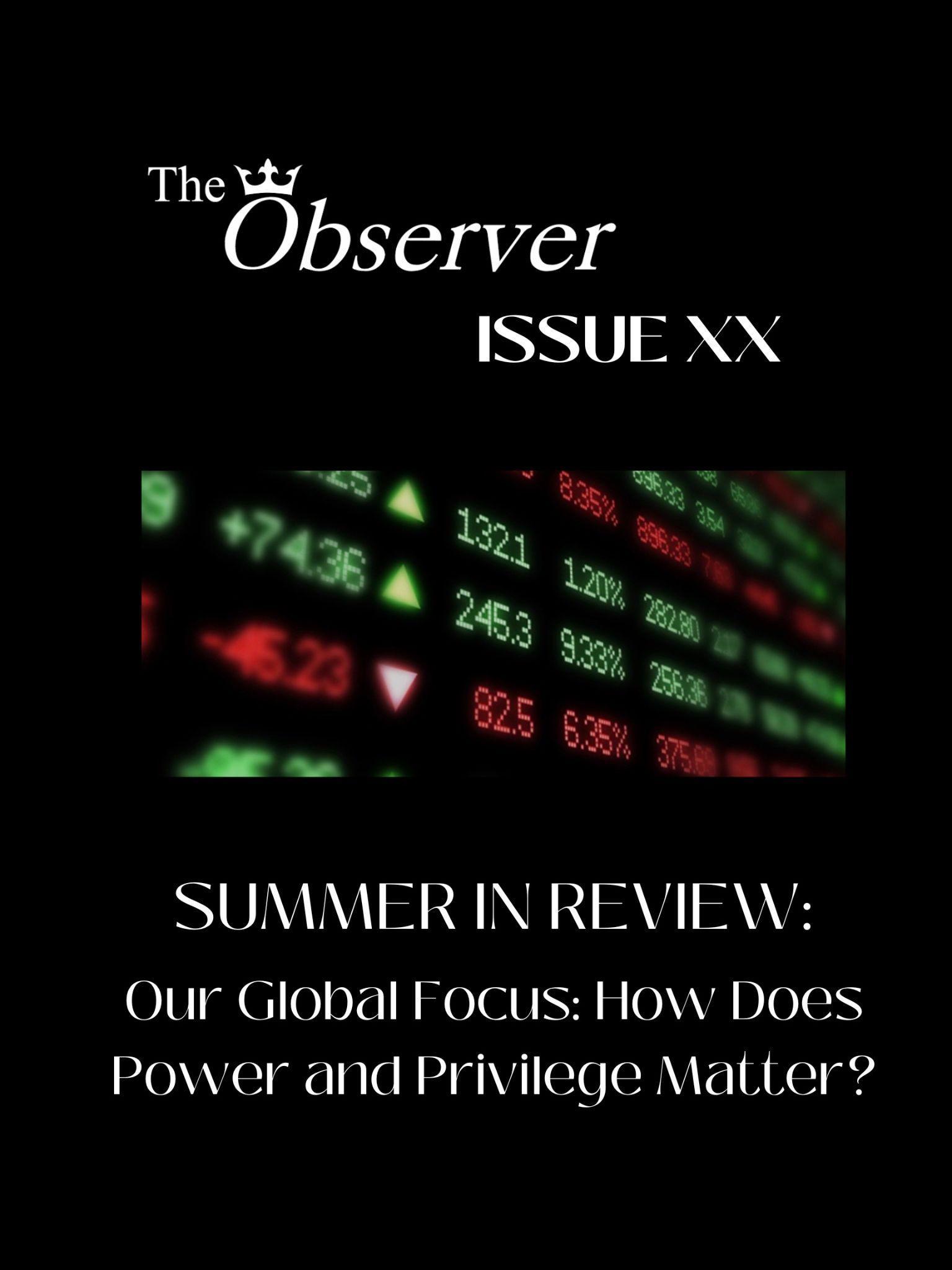
Wednesday, September 20th, 2023
Dear Readers,
I would like to welcome you to issue XX.1 of The Observer, “Our Global Focus: How Does Power and Privilege Matter?”.The Print team has worked hard throughout the summer to bring you the very best issue possible, compiling a spatially expansive story of how the summer reflected our issues’title. I cannot wait for you to join me in reading their reflections on our current political landscape.
This issue combines two seemingly elusive forces - power and privilege - and contextualizes them through events over a wide range of temporal and spatial contexts to show their pervasive nature. FromAlexander Ezquerra and Caitlin Elrick, we have pieces on the different dynamics within Canadian economics, focusing on labour movements and price fixing. From Lauren Hood, we have an article about new immigration reforms in the UK. From KaiwenTee, we explore the a case study of free speech using Islamic hate crimes in Sweden. FromAlyshaAhmad, we have a piece that delves into historical processes and impacts of colonialism on queer expression, focusing on the Indian subcontinent as a case study. From Eli Lang, we have a dynamic view of the coups across WestAfrica that continue to develop. Lastly, an article from me about the recent settlement between medical corporations and Henrietta Lacks’descendants, delving into the impacts of autonomy and medical racism.
I hope that you enjoy reading these diverse and thoughtful articles. I would like to extend my gratitude to my team of writers and editors for their hard work and dedication in creating this issue, and look forward to the great work we will continue to do this year. If you have any comments or questions, please contact The Observer at theobserver@qiaa.org. If you would like to contribute to future issues or join our team, follow us on X (formerly twitter) (@observerqiaa) or Linkedin (The Observer) for further updates, as well as our organization’s instagram (@queens.iaa).
Now, there is nothing more to say beyond enjoy the first issue of Volume XX!
Giuliana Iacobucci Print Editor-in-Chief, The Observer

THE OBSERVER XX.1 2.
Letter From the Editor
Hot Labour Summer:AStrong Canadian Labour Movement Must Include Migrant Workers
• Alexander Ezquerra, Assistant Editor
ConsumersAreToast: Canada Bread Price-fixing and the Illusion of Choice
• Caitlin Elrick, Staff Writer
Who Deserves What?The Impact of the 2023 UK Immigration Reforms
• Lauren Hood, Staff Writer
Islamic Hate Crimes: Exploring the Implications of Free Speech
• Kaiwen Tee, Staff Writer
Queerphobia as a Colonial Legacy:ABriefAnalysis of Queering the Map
• AlyshaAhmad, Assistant Editor
The Interweaving of WestAfrican Coups
• Eli Lang, Staff Writer
What Henrietta Lacks inAutonomy, the Medical Community Gains
• Giuliana Iacobucci, Editor-in-Chief
Lorem Ipsum dolor sit..........................## Lorem Ipsum dolor sit..........................## Lorem Ipsum dolor sit..........................## Lorem Ipsum dolor sit..........................## Lorem Ipsum dolor sit..........................## Lorem Ipsum dolor sit..........................## Lorem Ipsum dolor sit..........................## Lorem Ipsum dolor sit..........................## Lorem Ipsum dolor sit..........................## Lorem Ipsum dolor sit..........................## Lorem Ipsum dolor sit..........................## Lorem Ipsum dolor sit..........................## Table of Contents
04 07 10 13 17 20 23
THE OBSERVER XX.1 3.
Hot Labour Summer:AStrong Canadian Labour Movement Must Include Migrant Workers
by:Alexander Ezquerra
Canada has manufactured a second class of workers who due to their lack of rights, are unable to strike or refuse exploitative work conditions out of fear of deportation.This summer has seen an intensification of class division and conflict with a wave of strikes across NorthAmerica.The labour movement has sought to utilize its bargaining power to limit the inequality between rich and poor which has only been brought further into the spotlight with the cost-of-living crisis many families are facing. In the US, this summer has seen 320,000 workers involved in workplace strikes, ranging from UPS drivers to Hollywood actors and writers. Similarly, Canada has also experienced a summer of strikes as port workers in Vancouver to grocery
workers throughout theToronto area have all been involved, a wave of strikes many expected after 150,000 civil servants launched a strike in the spring. However, a group of workers not involved in this rejuvenated labour movement has been the many migrant workers who are essential to the Canadian economy. Migrant workers in Canada have a marginalized and precarious position in Canadian society, limiting their ability to organize and engage in collective action.
Migrant workers face not only the economic hardships of other workers but also are exploited by an economic and legal system that Canada maintains. Migrant work has always been essential to Canadian
development, perhaps the most important infrastructure project of the 19th century, the Canadian Pacific Railway, was built by Chinese migrant labour. Contemporary Canadian labour migration has been fueled by various Canadian
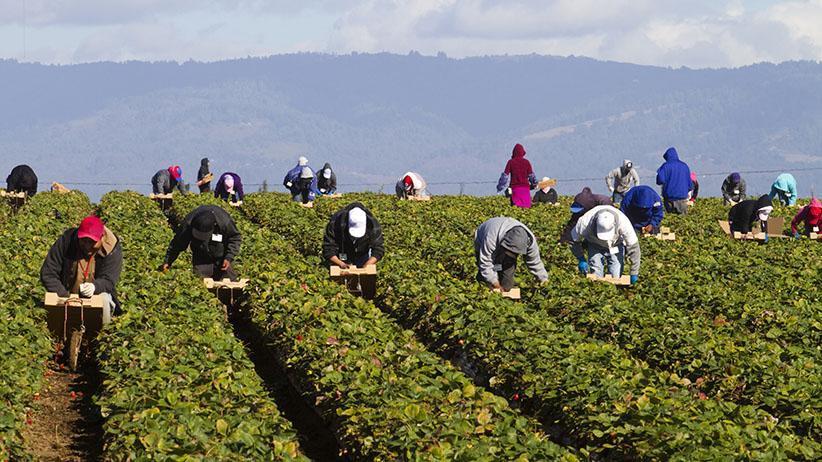
THE
XX.1 4.
Farming labour in Canada, mainly of migrant workers. Mark Miller/Getty Images
OBSERVER
programs to promote migrant work since the 1970s.Temporary migrant work has grown immensely under the auspices of theTemporary Foreign Worker Program (TFWP), which consists of the Caregiver Program and the SeasonalAgricultural Worker Program.TheTFWPfacilitates bringing workers from the Global South (ranging from Mexico and the Caribbean predominately forAgricultural work and the Philippines among other nations for Care work) to Canada for employers in need of a low-cost labour force. Migrant labour has become essential to the Canadian economy and only continues to grow, starting in September the federal government is launching a new project to make it easier for employers to hire temporary foreign workers, much to the behest of lobbying by the business community.
The explosion of dependence on migrant labour in Canada is not simply a narrative of domestic policy, as global trends also played a role in the growth of temporary foreign workers. Notably, the TFW program follows the phenomenon of workers migrating from the Global South due to the conditions of their domestic economy.The conditions of underdevelopment that fuel contemporary migrant work are partially a product of neoliberal restructuring across the Global South. Neoliberalism emerged in the 1970s as a political and economic system that transformed international relations and had lasting impacts on nearly all spheres of social life. Neoliberal policies
marched onto the world stage as a solution to the crises of the 1970s which were defined by inflation and staggered economic growth.Administered by the major financial institutions the International Monetary Fund (IMF) and the World Bank, neoliberal restructuring was imposed through StructuralAdjustment Programs that seek to reign in government intervention in the economy through policies of liberalization, austerity and privatization as conditions that must be met to be eligible for much-needed loans. These economic policies have come to dominate the Global South and played a major role in creating the need for men and women to migrate for work in the Global North. For states in debt, which neoliberal loans deepen, promoting temporary migration for work has been vital in securing foreign currency needed to pay off loans through remittances.This global restructuring has impacted labour-receiving states as well as labour-sending states, as the neoliberal turn in industries such as the global agri-food sector has led to Canada needing migrant labour to remain competitive in the international market.
Despite their unique position in Canadian and international economic and legal systems, migrant workers have shared issues with Canadian workers.The Canadian labour movement must take on issues that migrant workers face if it seeks to push back against the power imbalances between employers and employees. Migrant workers often face unfair wages, limited health insurance, exploitative conditions, and
THE OBSERVER XX.1 5.
unfavourable power relations.These issues ought to be taken on by the Canadian labour movement as the status quo allows for Canadian employers to have a reserve of workers who are socially vulnerable and without institutional power to challenge unfair practices. Without the Canadian labour movement, migrant workers have had to organize through international organizations such as the International Labor Organization or bring international human rights cases to court, both with very limited success in influencing domestic policy. In the past, the labour movement has often been resistant to migrant workers, limiting their ability to participate in their local union and even collaborating with employers to establish a ‘hierarchy of layoffs’that disadvantages migrant workers . During a time of increased labour activity, the issues of migrant workers ought to be given more consideration or else a renewed Canadian labour movement will legitimize labour conditions which produce a second tier of workers, who are at the whims of the federal government and their employer.
These historical trends of union tension with migrant workers remain today, as Canadian labour in the fear of having their rights and wages depressed, exclude migrant workers from their advocacy, creating an unequal disparity in rights. Despite these challenges, this rejuvenated Canadian union movement can enact a mutually beneficial and socially consistent relationship with
migrant labour. By taking on an explicitly political framework within the labour movement, migrant issues can be fought for and strengthen the impact of labour in Canadian policy. Putting social inclusion and basic rights for migrants central to labour advocacy can limit the unfair competition that employers create through exploitable migrant labour, but also can promote unionization for migrant workers, a source of membership that can be key to union survival during tumultuous economic conditions.
Canada is experiencing a time of renewed focus on class inequality and exploitation, yet migrant workers have not experienced an affirmation of solidarity by the major actors of Canada’s labour movements. Without an embrace of migrant workers by the Canadian labour movements, major employers will without resistance continue exploitative conditions which participate in a race to the bottom on Canadian wages and working conditions- ultimately worsening the already felt unequal and unfair nature of Canadian politics.
THE OBSERVER XX.1 6.
ConsumersAre Toast: Canada Bread Price-fixing and the Illusion of Choice
 by: Caitlin Elrick
by: Caitlin Elrick
Almost every single morning, my breakfast includes at least one slice of toast with butter and jam—meaning that bread is a crucial aspect of my day. This is why even when I trudge over to my local grocery store and learn that a loaf of bread is the highest price I have ever seen, I can’t bring myself to skip it—it’s a staple.
The unfortunate reality that myself and millions of other Canadians are faced with is that this high price of bread we’re shocked to see does not reflect the quality of the ingredients or the treatment of the workers who made it. Rather, it reflects the greed and manipulation present within Canadian food industries.
Price-fixing within the Canadian bread industry became a central topic of conversation in 2015 when the Canadian Competition Bureau began an investigation into notable retailers such as Loblaw, Metro, Walmart Canada, and Canada Bread. For many Canadians, these are retail chains that are frequented for staple groceries and home supplies, and are unavoidable aspects of their routine.
The eight-year investigation uncovered a collusion between major grocery retailer, Weston Foods, and bread manufacturer, Canada Bread, whereby the price of bread was illegally manipulated to boost the profit-margins of retailers at the expense of consumers. This violates Section 45 of the Canadian Competition Act which criminalizes the act of conspiring “to fix, maintain, increase or control the price for the supply of the product”. Canada Bread was
THE OBSERVER XX.1 7.
Monopoly board game. Marcy Leigh.
penalized with a $50 million fine for their role in the bread scandal—the highest fine the Competition Bureau has ever recommended.
Despite actively engaging in the unlawful manipulation of the price of bread, Weston Foods and Loblaw were both exempt from facing charges in exchange for their cooperation. However, in 2018, Loblaw still provided compensation to customers in the form of a $25.00 “I’m sorry” gift card—which might have been meaningful if not for the fact that Weston Foods’ 2018 sales exceeded $40 billion.
While arguably the 1985 Competition Act addresses the issue of price-fixing and monopolization in Canada, these laws are demonstrably insufficient as Canada Bread and its co-conspirators were able to influence the price of bread for a decade without consequence. This systemic failure has demonstrated that current Canadian competition laws do little to deter mega-corporations from exercising unwavering influence on the daily lives of Canadians.
Although some perceive Canada Bread’s acceptance of the fine as a resolution to this issue, in reality, this investigation is merely the tip of the iceberg when it comes to food inaccessibility, monopolization, and market manipulation in both Canadian and global food industries.
prepared to show no mercy. Price-fixing of Canadian bread is not the first and will not be the last example of corporations using their increasing power and influence to take advantage of the working class.
In the United States, over the last forty years, four multinational corporations went from owning one-third of the beef industry to over 80%, with farmer compensation decreasing and consumer price constantly rising. Correspondingly, global food markets are dominated by a handful of companies, which demonstrates that power is clearly the most defining factor in creating the conditions to access essentials for life.
In a capitalist economy, the only real power that consumers possess is that of choice. When a consumer chooses a product to spend money on, that choice makes a statement. Whether the statement is “I support companies that produce their goods locally and ethically” or “I only buy products with pretty packaging”, consumers are free to let their beliefs, goals, and priorities dictate how their income is spent. Increasingly, consumers are having this power stripped from them.
When food markets are monopolized by a few mega-corporations, consumers are left to choose between Box of Cereal A, owned by George Weston, and Box of Cereal B, also owned by George Weston, (both of which are overpriced and produced by a labourer who earns less in a year than Weston earns in 10 seconds—but fingers crossed the packaging is still pretty).
The reality is, consumers are at the mercy of mega-corporations and their CEOs, and it has never been more apparent that these entities are clearly
Corporations attempt to disguise this reality by filling grocery shelves with dozens of different brand names and logos, but hidden
THE OBSERVER XX.1 8.
in the fine print is the reality: choice is just an illusion. Food monopolies such as Nestle and PepsiCo, control such significant portions of market share that they are essentially unavoidable and invincible.
Although consumers in Western countries are undoubtedly victims of this system, the working-class citizens of developing countries are uniquely vulnerable to the predatory practices of labour outsourcing and resource exploitation from these companies. Foods that are considered household necessities such as coffee, sugarcane, and rice are acquired globally through forced labour and coercion, where farmers are often underpaid and abused.
Not only are consumers losing their ability to purchase products at price-points that actually reflect their value, they are losing the power of their dollar to support companies with products, business practices, and manufacturing that are ethical.
Consumer dissatisfaction with the current state of food markets has resulted in calls-to-action for governments to review and reform competition law in hopes that prices will lower, workers will receive better treatment and fair pay, and the power of choice will return to the hands of the working-class consumer. While existing legislation aims to address concerns surrounding price-fixing and monopolization, it is clearly ineffective at combating the depth and complexity of this issue in its current form. Until global governments begin holding mega-corporations accountable and
prioritize the working class, I might have to start skipping breakfast.
THE OBSERVER XX.1 9.
Who Deserves What? The Impact of the 2023 UK Immigration Reforms
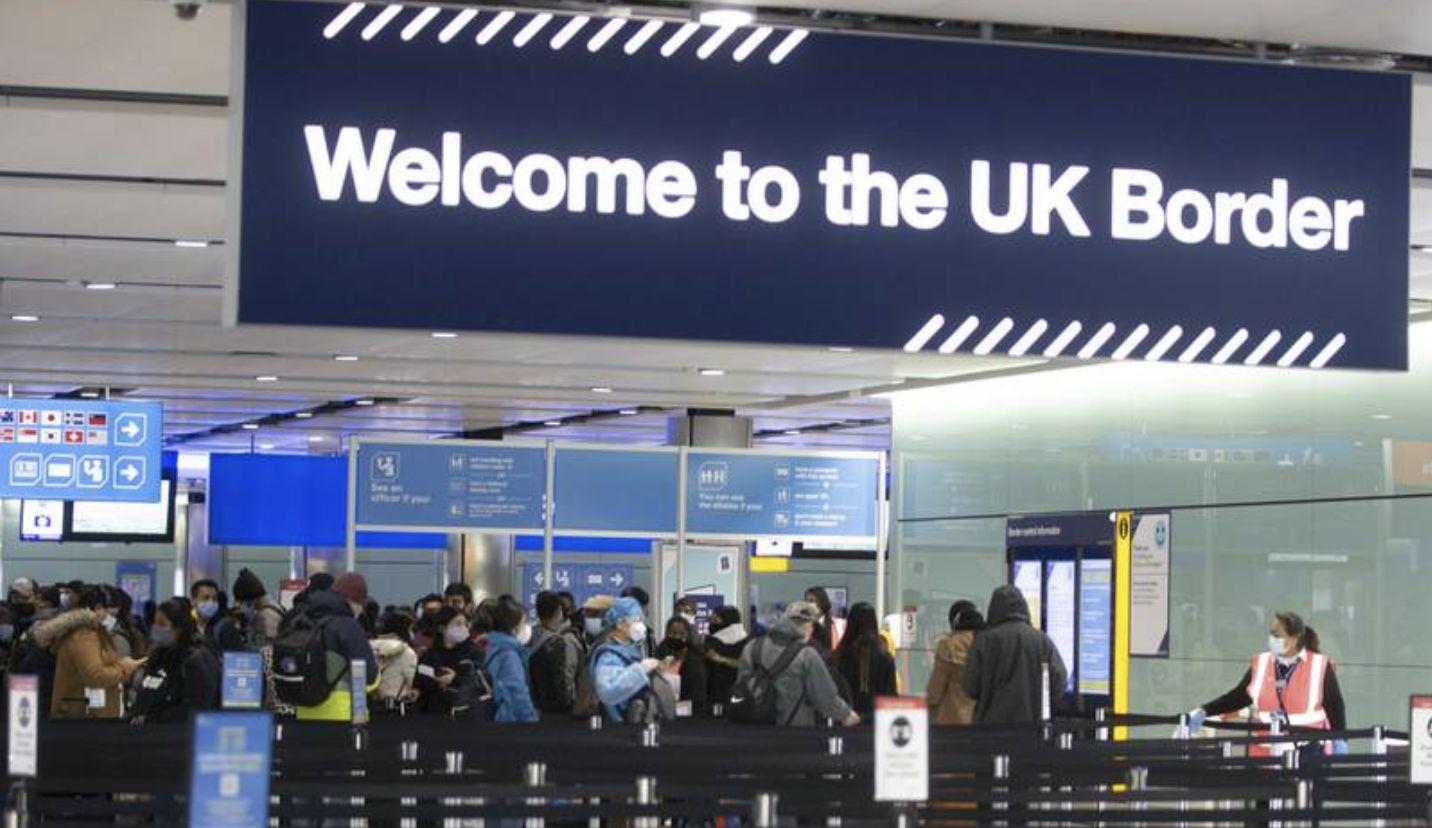 by: Lauren Hood
by: Lauren Hood
Through the midst of rising immigration numbers , in an attempt to address these ever-evolving challenges, the United Kingdom has introduced new immigration laws in 2023.As this reform marks a significant shift in the country’s approach to immigration, both security and inclusivity come to light in whether this change is best fit for the UK's economy and society.The changes are expected to impact various aspects of immigration, whether it be work visas or family sponsorships, the new key features and implications of UK’s immigration laws must be properly
understood. Who will be directly affected by these changes? Understanding the new implications of the UK’s reformed immigration laws assesses the changing dynamic for 2023.
The UK has now implemented a point-based system that determines one’s visa application based on factors, such as skills, qualifications, language proficiency, and job offers. In having a concrete system set in place, the UK government is able to prioritize high-skilled immigrants who would be the most beneficial to the economy. In prioritizing individuals with sought-after skills, who is to respond to the changing needs of a country; yet, who is to respond to prioritizing from the start? Being able to speak English and be paid
THE OBSERVER XX.1 10.
The entrance to the UK border. Getty Images.
the minimum salary of 26,200 euros will guarantee higher points. For those, however, who make less than, but have some redeeming qualities, such as a job offer in an in demand occupation or have a relevant Ph.D., an applicant would still be considered.This comprehensive evaluation system takes into account the individuals whose skill level aligns with the economy’s needs.
As for the new Skilled Worker Visa, applicants are assessed based on a combination of these factors, determining their worth in points. However, when it comes to family, students, or citizenship, the UK’s reformed immigration policy has different assessments for these specific scenarios. With the new immigration laws, international students who contribute to both the country’s economy and academics allow students to study in the UK to increase opportunities after graduation.Additionally, the new changes in family sponsorship rules are designed to promote family reunification. To do so, individuals are now able to sponsor their family members, uniting them together and eligible individuals to connect in the United Kingdom more easily. Lastly, in finding citizenship in the UK, the updated laws implement and recognize individuals who have contributed to the family.Those who are acknowledged for their help in the economy make both points and status more attainable for those working towards UK citizenship.
It should be said, however, that the altered implications regarding immigration and citizenship in the United Kingdom did not always look like this. In the past ten years, the overall growth of the UK population has risen by slightly more than 3 million people (between March 2011 to March 2020).
Furthermore, an estimated 6.3 million from January 2000 to March 2020. With the drastic continuation of immigrants seeking refuge in the United Kingdom, its policy was bound to require some change.Additionally, in comparing the United Kingdom’s ImmigrationAct of 1971, it remains evident that the updated standards implemented in 2023 are much more rigorous. Reiterating the changes stated by the UK Parliament, it becomes evident how significant new immigration policies are. With the point system solely determining who has the necessary qualifications to live in the UK, there is no doubt how pivotal the recent laws truly are.
While it is understood that the United Kingdom’s renewed immigration laws signify a transformative step towards redefining the country’s approach to immigration, it raises the question of one’s worth and qualification. By prioritizing high-skilled workers, family reunification, and acknowledging the contribution of healthcare professions, the United Kingdom’s government has created an economy
THE OBSERVER XX.1 11.
that strengthens its many diverse talents. These pathways to citizenship acknowledge and appreciate the contributions of immigrants to the nation, shaping the fabric of the United Kingdom’s society and economy for many years to come.Through the new reforms, its policy considers the diverse talents many individuals have and positions itself at the intersection of security, inclusivity, and economic prosperity. By doing so, the United Kingdom’s society and economy are engraved to have a lasting impact for many generations to come.
THE OBSERVER XX.1 12.
Islamic Hate Crimes: Exploring the Implications of Free Speech
by: Kaiwen Tee
Public burnings of the Quran in Sweden have taken the world by storm and sparked not only major controversy and potential security threats, but also a broad discussion on the extent of free speech and the degree to which governments should intervene.
This issue began to gain traction in mainstream news in June of this year when an Iraqi refugee ripped and burned the Quran in front of a mosque in Sweden. However, this was not the first time anti–Islamic demonstrations were expressed in the country. In January this year, a Danish-Swedish far-right politician also burned the Islamic holy book outside theTurkish embassy in Stockholm. From there, the global response took off, starting
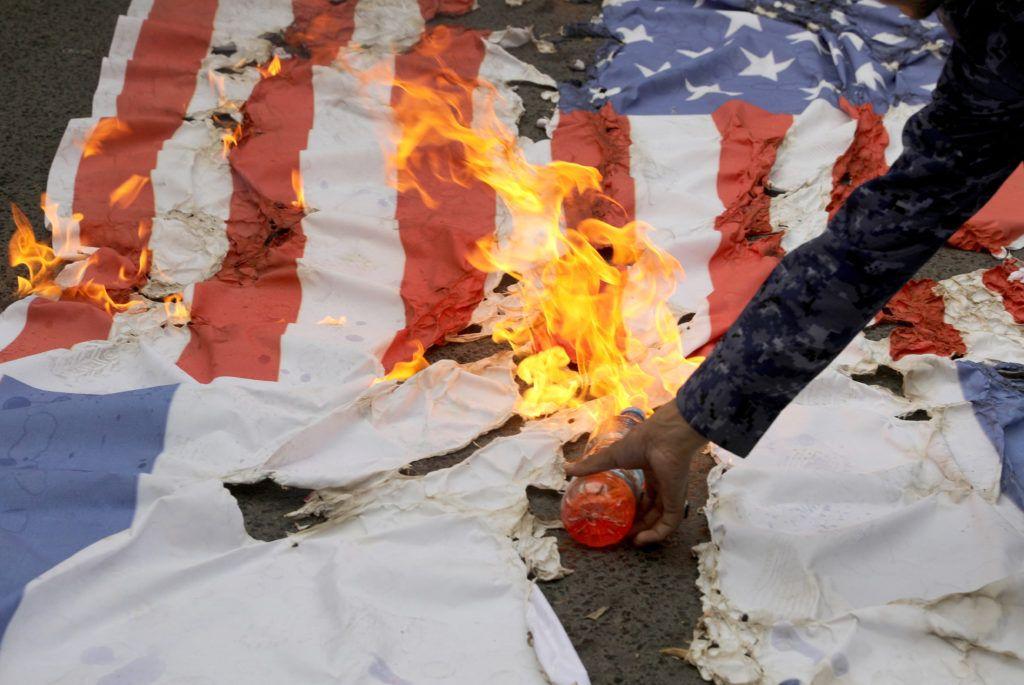
a chain reaction that has yet to be grounded.
Both Sweden and Denmark are secular countries, meaning that their public sectors and laws are detached and neutral towards all religions. In fact, Sweden is so secular that its constitution protects freedom of expression to a broader extent than theAmerican first amendment, according to law professor Martin Schultz at Stockholm University.
Neither country has blasphemy laws in place, meaning that any act of contempt against a religious or ‘sacred’object is legal. If we use the assumption of ‘intrinsic value’in speech, the lack of such regulations makes sense.
THE OBSERVER XX.1 13.
Swedish protesters denounce Quran burnings KhaledAbdullah/Reuters.
This idea validates the broad protections afforded by such governments with regards to free speech, as intrinsic value essentially claims that ‘all speech is good speech’. In addition, instrumentalist arguments also support such protections. Instrumentalist arguments regard the utility of freedom of expression in sociopolitical contexts and consider the practicality of such shields. Protection of free speech, including blasphemy, provides the public with the ability to dissent against potential monopolies of many different sectors, from political to commercial. Some also argue that allowing true freedom of expression gives activists (or potential radicals) an outlet to relieve steam that could potentially turn dangerous if left to fester — a paraphrased statement by U.S. Justice Louis Brandeis in the 1927 case of Whitney v. California.
However, if we examine the same issue from a different perspective, the situation shapes up in a different manner.Although Brandeis makes a reasonable point, allowing “too much” free speech has the potential to encourage hate, rather than diminish it.Acontemporary example of this is John Lauro, DonaldTrump’s lawyer, claiming that the criminal charges brought forth against him are an “attack on free speech”.These charges include his attempts to overturn the 2020 election, which some say culminated in the violent and aggressive riots on Capitol Hill in January of 2021.Although this is a very different situation from the Quran protests, it is still an example of how legislation, such asAmerica’s FirstAmendment, can be manipulated in favour of heinous actions.
Another point to consider in this situation is Sweden’s ongoing effort to join NATO’s military alliance.Although the country has historically been neutral in global politics, the instability caused by Russia’s recent invasion of Ukraine prompted a change of heart. But how does this relate to the Quran burnings?There are currently only two Muslim-majority countries in NATO: Turkey andAlbania.Turkey was one of the countries that protested Sweden’s addition to NATO, and the perceived disrespect displayed against Muslims only fuelledTurkey’s tensions with Sweden.This is a slight against the argument for those who support intrinsic value in speech. One of the aforementioned arguments, that free speech can provide an outlet to relieve tensions, is clearly dismantled as the ‘free speech’in this case has been shown to have the opposite effect. In fact, the increase in hostility between Sweden andTurkey led toTurkey referring to possible discussions with Sweden as ‘meaningless’.Turkey also threatened to revoke any support for the Nordic country’s NATO application if Sweden kept their policy of neutrality towards the burnings.Although this is the opinion of only one country, the reality is that if Sweden joins NATO, their current policy of free speech and neutrality can no longer suffice. In an increasingly polarised world, the idea of staying neutral is now considered akin to siding with the opposition. It is only from a privileged viewpoint that one could claim neutrality as an option, as doing so ignores marginalized peoples’sufferings.The premise of NATO is to ensure peace
THE OBSERVER XX.1 14.
and compromise between countries, while providing agreements for mutual protection. If Sweden refuses to act in accordance with its own politics, it would be justified for other countries in NATO to question if Sweden would intervene in their issues.
At the same time, it is not fair to jump to conclusions in favour of offended countries and to criticise Sweden so quickly.The news is paradoxical in a way that it has become an increasing trend to support minority groups – who typically get the short end of the stick – faster than those of a privileged demographic. As readers, we typically root for the underdog, but this can lead to blind spots when critically analysing media. By looking at news from a Western perspective, it is easy to view the offended countries (including Syria, Iraq andAfghanistan) as victims, but from a globalized point of view, they may be defined as overlords. In Sweden, where the burnings occurred, over 60% of the population is Evangelical Lutheran, a Christian denomination. However, in comparison, a report commissioned by the British government showed statistics that the proportion of Christians in the Middle East fell from 20% one century ago to under 4% in 2019.Adifferent report made by the advocacy group, Open Doors, also found that the countries with the highest rates of persecution against Christians include Afghanistan andYemen, and that the number of Christian-targeted deaths rose by over 1,000 from 2021 to 2022.The persecution defined by the report involves stereotyping, discrimination, and disinformation on Christianity;
actions strikingly similar to the kind disavowed byAfghanistan, Syria, and Iraq, among others, when the persecution is against Islam.
Returning to the current situation, looking at the historical precedent regarding anti-Islamic demonstrations shows us how the current situation poses a major security risk. In 2006, similar discord arose as a response from anti-Islamic cartoons drawn in a Danish newspaper, which Muslims felt were a mockery of their Prophet Muhammed. In similar fashion to the government’s response to these Quran burnings, the Danish government deemed the drawings to be protected by their free speech laws, claiming “the government does not print the papers”.The statements made at the time reflects the difference in free speech ideology between Denmark and the countries finding issue with the cartoon. Once again, the fact that the drawings were protected is due to the base concept that all expression has inherent value simply by existing.The implications of such value and the negative ramifications from the drawings were not considered, as legislature binded the hands of the Danish government.This sparked widespread controversy and led to retaliation from Muslim-majority countries and Muslims globally.These responses ranged from thousands marching peacefully inAfghanistan to violent riots and the attempted destruction of the Danish embassy in Syria.
In conclusion, this situation is both sobering and indicative of a larger issue that is increasingly prevalent today.The bystander effect is a well documented.
THE OBSERVER XX.1 15.
psychological phenomenon, and applies not only to inaction against bullies in the schoolyard but to wider political contexts. As we have seen with Ukraine, words of support are meaningless without real action. However, after examining both sides of the free speech argument, and observing how both regulation and a lack thereof can be detrimental, what is the solution?The reality is that there is no “one size fits all” fix to this issue. Political situations are shades of grey rather than the black and white “good guy, bad guy” scenarios the media typically portrays. The one conclusion that may lead to a solution is that, in order to find a compromise, everyone needs to lay their aggression and prejudice to the side and open their minds to different perspectives
THE OBSERVER XX.1 16.
Queerphobia as a Colonial Legacy:A BriefAnalysis of Queering the Map
by:AlyshaAhmad
“I, along with my queerness, have travelled here and longed,” was just one of the many messages submitted to QueeringTheMap.com from Pakistan.
QueeringTheMap allows members of the 2SLGBTQ+ community to digitally archive their experiences in relation to physical space. Same-gendered relationships continue to be illegal in Pakistan, with severe punishments, including life imprisonment and hefty fines.
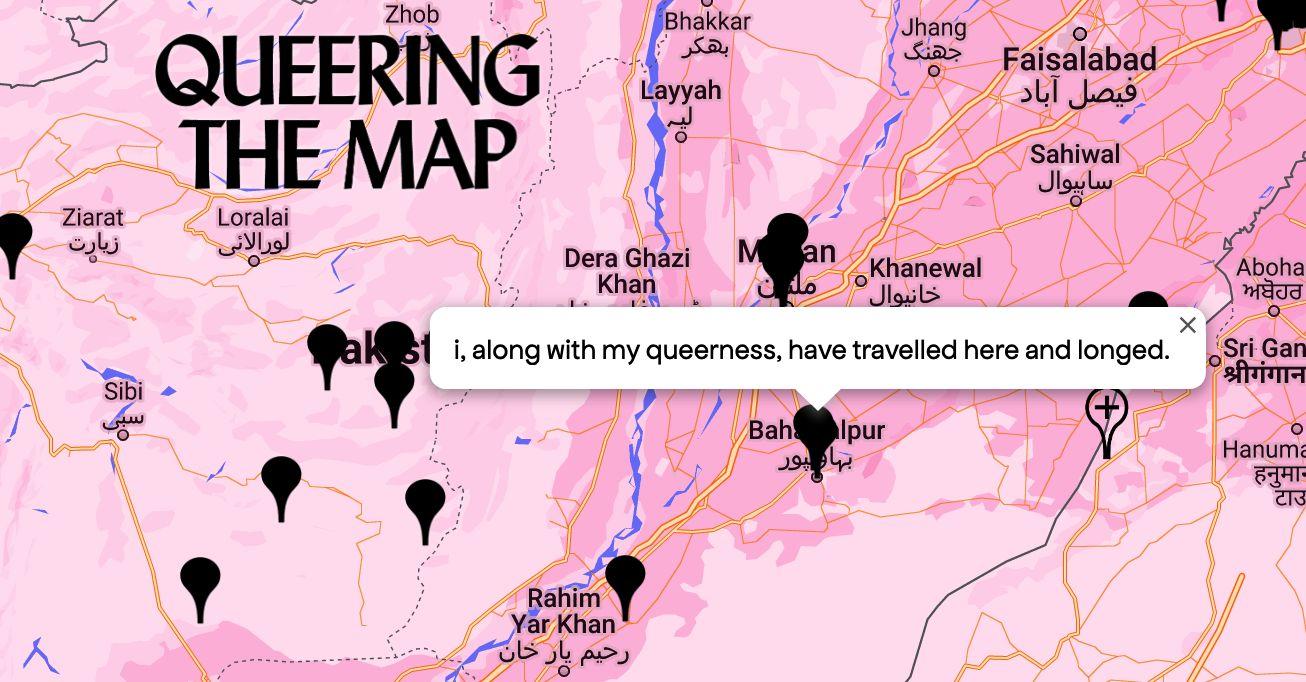
QueeringTheMap reminds us that members of the 2SLGBTQ+ community exist in regions where it is illegal for them to do so. What is particularly notable about regions where Queerness is persecuted is that these regions were subject to British imperialism. Out of 66 countries that criminalize Queerness, 36 countries, which is more than half, were colonized by the British.
Accordingly, it is clear that there is a relation between colonialism and Queerphobia.
Prior to colonial rule in the Indian subcontinent, Queerness was not outlawed in any way. For instance, the “khwaja sira'' community has been recognized as a third gender, long before British presence. Members of the khwaja sira community were invited to sing and dance at celebrations, and even held advisory positions to the Mughal court.To truly grasp why members of the Queer community in the Indian subcontinent are now subject to persecution, it is important to understand the impact that British colonialism has had on the Queer community in general.This means understanding the historical origins of Queerphobic laws and their relation to colonialism.
THE OBSERVER XX.1 17.
Post of Queering the Map User. Queering the Map.
In 1533, Henry VIII issued the Statute of 1533, which made sodomy a civil offence, punishable by death.This was the case until 1828, after which it became an offence punishable by imprisonment. In 1858, the British Raj began its 89-yearlong occupation of the Indian subcontinent, which consists of India, Pakistan and Bangladesh. Just three years later in 1861, Section 377 was introduced by the British Raj, which was modelled after the Statute of 1533, bringing the persecution of Queer people to the Indian subcontinent. Specifically, this law criminalized any act that goes against the order of nature with any man, woman or animal.The British Raj strived to transform Indian society by enforcing traditional western and Judeo-Christian sexual norms, which viewed sexual freedom as barbaric and perverse.The British were worried that their colonial officers abroad would be corrupted by the “barbaric” practices of the Indigenous populations. Later, Section 377 was imported to other countries that the British colonized, including countries in theAmericas,Africa and other countries inAsia.This indicates how the persisting oppression of members of the 2SLGBTQ+ community is a remnant of colonial rule, which is especially made clear by QueeringTheMap.
QueeringTheMap contains a land acknowledgement in the sidebar of the site, that recognizes the website’s development on “the unceded traditional lands of the Kanien’kehá:ka Nation…the island currently called ‘Montreal’.” In addition to the use of the
site by Queer people in Queerphobic countries, the site directly recognizes that colonialism continues to play a role in Queer existence, which challenges the dominant (and incorrect) notion that Queerness is a thing of the west.A simple land acknowledgement allows for common notions of Queerness to be moved away from its highly western-centric perspective, which prompts us to challenge notions of colonial thought that we think to be commonplace. For instance, many Indigenous communities recognize Two-Spirit individuals and have done so for millennia.To reclaim indigeneity, identifying asTwo-Spirit is a means of decolonization, which requires challenging and dismantling the colonial constructs of the rigid gender and sexual orientation binary that was imposed by the British. Nonetheless, despite many of these countries having since been liberated from British brutality, they continue to have laws banning Queer existence.Accordingly, can it not be argued that Queerphobic countries are Queerphobic on their own volition?After all, some of these countries have been independent from the British for many decades; so they now have the freedom to change their laws.
But this is not the case. British colonialism has affected numerous aspects of social norms and culture, including standards of beauty and even aspects that are as normalized as what is deemed to be professional conduct and attire.Changing laws that were established during colonialism after independence is very complex due to the power dynamics that continue to
THE OBSERVER XX.1 18.
influence countries that were colonized. Those who are in power in these countries benefit from the laws established during colonialism, causing them to be resistant to change. Additionally, changing laws, including those that are Queerphobic, require there to be a major transformation of societal attitudes. Overhauling prevailing notions of systemic oppression is difficult as a result of the violent means of control that the British used against the people that they were colonizing. For instance, the British developed the Residential School System, wherein Indigenous children were abducted and forcibly indoctrinated into British culture.The devastating results were the loss of Indigenous cultures, and physical, sexual, emotional and psychological abuse; not to mention the hundreds of graves of Indigenous children that have recently been discovered.
Briefly, it is also important to recognize how colonialism is inextricably tied to the accumulation of capital, thereby also shaping the experiences of people who are colonized. Colonial laws were enforced to increase labour production –and wealth – for the British. Queerphobic laws are linked to the British Empire’s desire for increased wealth since these laws were dependent on western gender roles. For instance, British notions regarding men and women posited that men were meant to be the breadwinners of their family, while women were solely made to be responsible for familial matters alone. But how does this relate to the accumulation of wealth? Men were provided with compensation for their labour (albeit not
enough as they were the subjects of colonizers, after all), while women were not compensated for their domestic and caregiving roles.This made possible the existence of a cheap labour force, allowing for increased profits to line the pockets of British colonizers.Accordingly, the cultures that the British colonized were negatively impacted, since British colonization turned gender into a binary, with one having value over others. Indigenous cultures inTurtle Island, for example, have recognized the fluidity of gender and sexuality for centuries, prior to European contact. However, Christian missionaries rejected the validity ofTwo-Spirit people, forcing them to adhere to patriarchal gender roles, and causing some Indigenous groups today to think negatively about Queerness. Specifically, these very missionaries forced children into residential schools to absorb British patriarchal culture and be used as free labour for the British.
Ultimately, the British Empire managed to brutalize multiple populations across hundred-year spans, having intense impacts on these populations today.This is demonstrated by the existence of Queerphobia in countries that were once colonized. From stolen voices to silenced identities, the echoes of colonialism continue to shake the lives of members of the 2SLGBTQ+ community, reminding us that the effects of colonialism remain alive and well today.
THE OBSERVER XX.1 19.
The Interweaving of West African Coups
by: Eli Lang
African military coups generally grace NorthAmerican news feeds for minutes if at all. WestAfrican coups have become un-surprisingly common, and are often dismissed as purelyAfrican problems with limited reverberation outside of the continent.TheAugust coup in Niger has spurred developments far less common than typical leadership rotations seen in WestAfrica. Niger’s coup and the regional reactions to it are the final links in a chain of coups in the Sahel which are dismantling the Western and theAfrican forces which limit “African problems” to Africa.
In earlyAugust, oneAfrican coup gained slightly more attention than
others because of the regional response that it received. Once Niger’s military Junta ousted their democratically elected president, ECOWAS (Economic Community of WestAfrican States) threatened to invade the country to end the coup.The leaders of ECOWAS states have been democratically elected, and tend to promote close Western relationships in their region. ECOWAS have concluded that the rapid pattern of WestAfrican democracies falling to military coups must end with Niger.The coups which ECOWAS referred to took place in Mali and Burkina Faso, and both states’ leaders have recently swore that they would help defend Niger
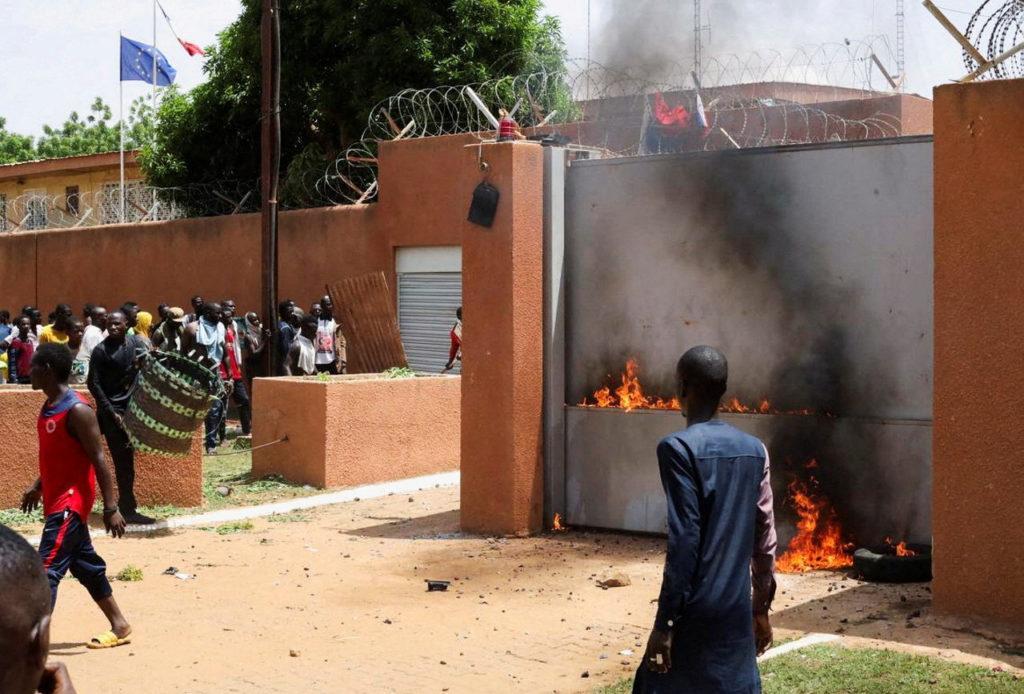
THE OBSERVER XX.1 20.
Demonstrators outside French embassy in Niger. Souleymane AgAnara/Reuters.
in response to ECOWAS’threat.The military leaders of Mali and Burkina Faso are strongly opposed to Western intervention in Africa, and have turned towards Russia and Wagner PMCs for support.Astand-off which threatens a regional war between more than a dozen belligerents has appeared in response to one coup.Although only one government fell in this particular place and moment, Niger’s coup can be framed as the cumulative event in a series of coups in the Sahel.
From 2021 to 2023, three coups in neighboring countries in WestAfrica took place. First Mali, then Burkina Faso, and finally Niger experienced coups of similar natures.These three coups all saw the replacement of flawed democracies with authoritarian regimes. Each of these three countries also shares a history of French colonization, some of the most violent terrorist insurgencies in the world, and former membership in ECOWAS (Economic Community of WestAfrican States). Mali, Burkina Faso, and Niger make up almost half of the Sahel, the impoverished strip of arid land which spans the continent.The Sahel is home to some of the most violent jihadist terrorist groups in the world, many affiliated with ISIS andAl-Qaeda.As of 2023, the Sahel’s terrorism threat is worsening.As of 2023, the region accounts for 43% of the world’s terror-related deaths. Throughout the past decade, France has stationed troops in their former colonies around the Sahel in order to carry out anti-terrorism missions like Operation Barkhane and attempt to bring greater stability to the region.
France’s forces in the Sahel were among
those working to suppress terrorism in the region, but the mission never yielded results resembling a final victory. France’s operations led to dozens of civilian deaths, and accusations of condescension and neocolonialist behavior.Anti-French sentiment is increasing throughout former colonies in WestAfrica, being a significant factor in all three recent coups. During pro-coup demonstrations throughout the countries, the burning French tricolor was a common sight. Coup-leader’s messages and public sentiment are driving French forces from the Sahel, removing a well-equipped fighting force from theAfrican fight against terrorist insurgencies.The French military’s infamous legacy in West Africa, in combination with accusations of ongoing over-extended influence may be leading to the decline of French influence in the Sahel. France’s losses in WestAfrica also appear to equal victories for Russian military and political influence. In addition to French forces’ ouster from the Sahel representing a loss for anti-terror efforts, the potential regional conflict currently being threatened could create another proxy conflict between Russia and the West.
The French mission is far from the only initiative which has tamped sub-Saharan extremism, and which is being crippled by the coups of the past 3 years.The splitting of ECOWAS’member states brings an end to the multilateral cooperation and military operations
THE OBSERVER XX.1 21.
which have taken place across sub-SaharanAfrican borders which have contributed to the decline of groups like Boko Haram. ECOWAS states that once cooperated over agreements like the Accra initiative now threaten each other with war today. Fundamentalist terrorist groups recognize no borders, and have attempted to branch between countries, prevention of this spillover was the exact goal of theAccra initiative (Theroux-Benoni). Obviously, the military cooperation required of ECOWAS’former states will no longer be possible with their weapons turned on one-another.
ECOWAS’standoff with Niger and its new allies reveals the extent to which so manyAfrican coup’s roots intertwine. NorthAmericans often react toAfrican coups as if they are simply inevitable and inconsequentialAfrican rejections of democracy.The truth is that many African coups share similar interests and ideologies which can link their separate occurrences into nearly a single process.African coups are often dismissed as insignificant when witnessed separately, but when viewed as a drawn-out process the consequences are clear. Mali, Burkina Faso and Niger demonstrate this perfectly.The three states have all ousted the irritating but advanced French forces. Russian Wagner mercenaries who are already proving less effective in Mali, will likely replace the French in all three countries. Finally, each country has aligned against the rest of the union which they
used to promote regional security alongside.
At the time of this article’s writing, it is yet to be seen for certain whether Niger’s coup will result in a full scale war. What has been made clear however, is that the unfolding of neighboring coups across the Sahel has already stripped away the strongest regional initiatives to restrict the expansion of jihadist insurgency. The Sahel’s form of terrorism is more violent than most around the globe. Now there is no structure to limit that terrorism to certain cells, towns, or even countries in the region. Coups unfolding across WestAfrica could give rise to weakness and war which could produce fundamentalist momentum of grave concern. It is by no means inevitable that the jihadists of the Sahel will be capable of promoting terror globally. However, if terrorism spreads out of WestAfrica as it once did from Syria, the world will quickly recognize thatAfrican coups are by no means simplyAfrican problems in either their origins or their effects.
THE OBSERVER XX.1 22.
What Henrietta Lacks inAutonomy, the Medical Community Gains
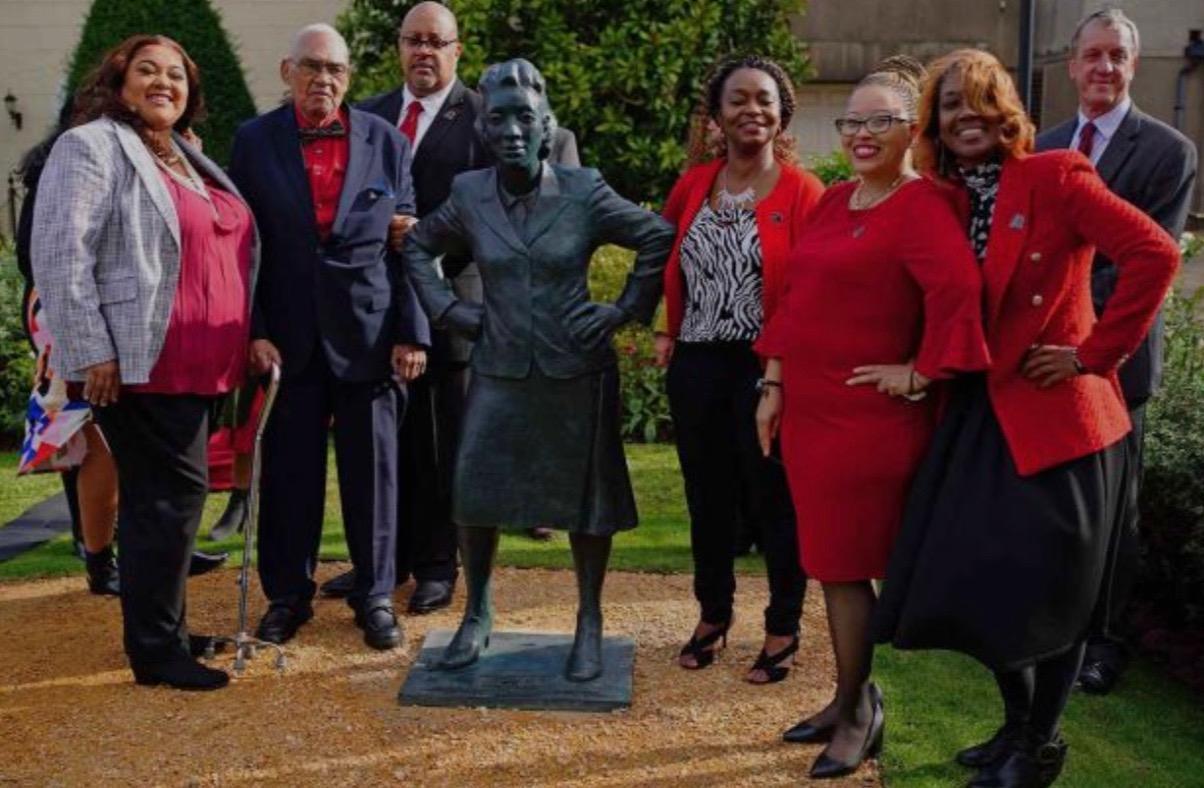 by: Giuliana Iacobucci
by: Giuliana Iacobucci
How much money have your cells made? For most people, this question is unanswerable. But for the family of Henrietta Lacks, the profit from her cells is most likely in the billions - and they have not seen any of it. With a long-anticipated lawsuit, the family of Henrietta Lacks - the direct ancestors of what is known as the HeLa cell line - finally has an answer to that very question.
The case of Henrietta Lacks - a Black impoverished woman from the Southilluminates the intersections of power and privilege regarding consent, and how racism along with other forms of
oppression creates barriers to legal and bodily autonomy.The struggle for justice for the Lacks family is one that encompasses a long history of medical racism, unethical research practices, and an unshakeable power dynamic between corporations and individuals.
In earlyAugust of 2023, the Lacks family settled a lawsuit in the United States lodged against a biotechnology company because the company garnered millions in profit from non-consensually collected cells.The cells were collected from Henrietta Lacks in 1951 at Johns Hopkins Hospital, where Lacks was seeking treatment for cervical cancer.The cells collected from Lacks are the first “immortalized cell line”, and have been used for research in cancer,
THE OBSERVER XX.1 23.
Henrietta Lacks’ family posing with her statue. Ben Birchall - PAImages/Getty.
Ebola, IVF, human genome studies, virology, tuberculosis, and the recent COVID-19 vaccine. Laboratories in the US have produced over 60 tons of the HeLa cell line.The Lacks family has not been included in any of the profits, and the lawsuit was argued on the grounds of medical racism in medical experimentation. Race-based medicine is part of the perpetuation of racial injustice and unethical practices, as it reinforces race as part of biology instead of its reality as a social construction, which is an important aspect of the grounds of the suit.
Racism compounded with other forms of oppression, such as patriarchy, are historically commonplace in medical research practices; for example, foundations for modern gynecology were formed from the unethical and barbaric experimentation of young enslaved Black women.Although the National Institute of Health (NIH) has attempted to create general policies to protect research participants and medical patients - such as the Genomic Data Sharing policy which requires informed consent to access genomic data and an agreement with the Lacks family regarding access to the HeLa cell line - this attempt is not comprehensive enough to address the systemic racism present in the medical field.
power that corporations have over the independence of racialized individuals. This case represents a compounding of class, race, and gender in marginalizing the Lacks family, wherein the justice they received was long overdue. Even though the family settled, the continual use and legal control over the HeLa cell line shows how much power pharmaceutical companies and medical researchers have compared to the Lacks family; the disadvantages compound on one another, which results in small gains for the Lacks family compared to the monumental profits and affluence companies gain from their bloodline.
Further, the positionality of Henrietta Lacks herself demonstrates the little value placed on Black women’s autonomy and contributions.
Corporations continue to profit off of her cells - parts of her physical bodydespite paying next to nothing for them, while Lacks paid with her life.The disadvantage and oppression that Black women face are illuminated by the continued use of the HeLa cell line.
Many of the foundations of modern medicine are rooted in the unwilling sacrifices of Black women, whether it be gynecology or viral diseases, showing how their bodies are only valued for research; instead of there being an inherent precious value placed on their lives.
The lack of legal autonomy that Henrietta Lacks and her family have shows the
THE OBSERVER XX.1 24.
The use of the HeLa cell line in medical research affects the international political community in many ways, including the combatting of diseases and the flow of knowledge and wealth. Without the HeLa cell line, crucial research for the COVID-19 vaccine and the profit garnered from pharmaceuticals and research simply would not be possible. Globally, corporations, individuals, and medical organizations are indebted to Henrietta Lacks’ unwilling and non-consenting contributions to science.
The case of Henrietta Lacks is essential to acknowledge as it also illuminates other facets of justice and autonomy. Now that the suit is settled, the medical community must abide by whatever the settlement entails, even if it means no longer using the HeLa cell line. Further, the research community should remain and continue to be vigilant about the harms and abuses that research participants face, being mindful of the unique dangers faced by various people. The struggle of the Lacks’family in receiving justice shows how the legal system places different values on truth from various people aiming to navigate its complexity, and the different ways justice is distributed based on positionality.The Lacks family did not receive justice until over 70 years after Henrietta Lacks’death,
and their victory is marginal compared to the profits and epistemological gains of the medical and pharmaceutical industry.The Lacks case displays the real-world oppression that Black women face, with their lives being devalued and broken down into constituent parts for profit. Without Henrietta Lacks’ non-consensual donation to science, we would not be as medically-advanced today. Doesn’t that family deserve the same credit the medical community has been given a thousand times over?
Most importantly, the case of Henrietta Lacks gives face and airtime to the abuses and negligence marginalized peoples face in the medical system at large, from research to care.This individual case is essential to acknowledge, but we should not forget all of the unwilling sacrifices many marginalized peoples gave for medicine without due acknowledgement, justice or consent. Consent is important, and is undervalued and non-existent, because of the emphasis on profit over people, especially regarding Black contributions and autonomy. Many cases like this exist and persist, and do not have the benefit of foundations, books, and infamy surrounding them; to that, the court of public opinion must give its view towards such cases and hope that justice can be given to reclaim autonomy and legal control over bodies and life.
THE OBSERVER XX.1 25.
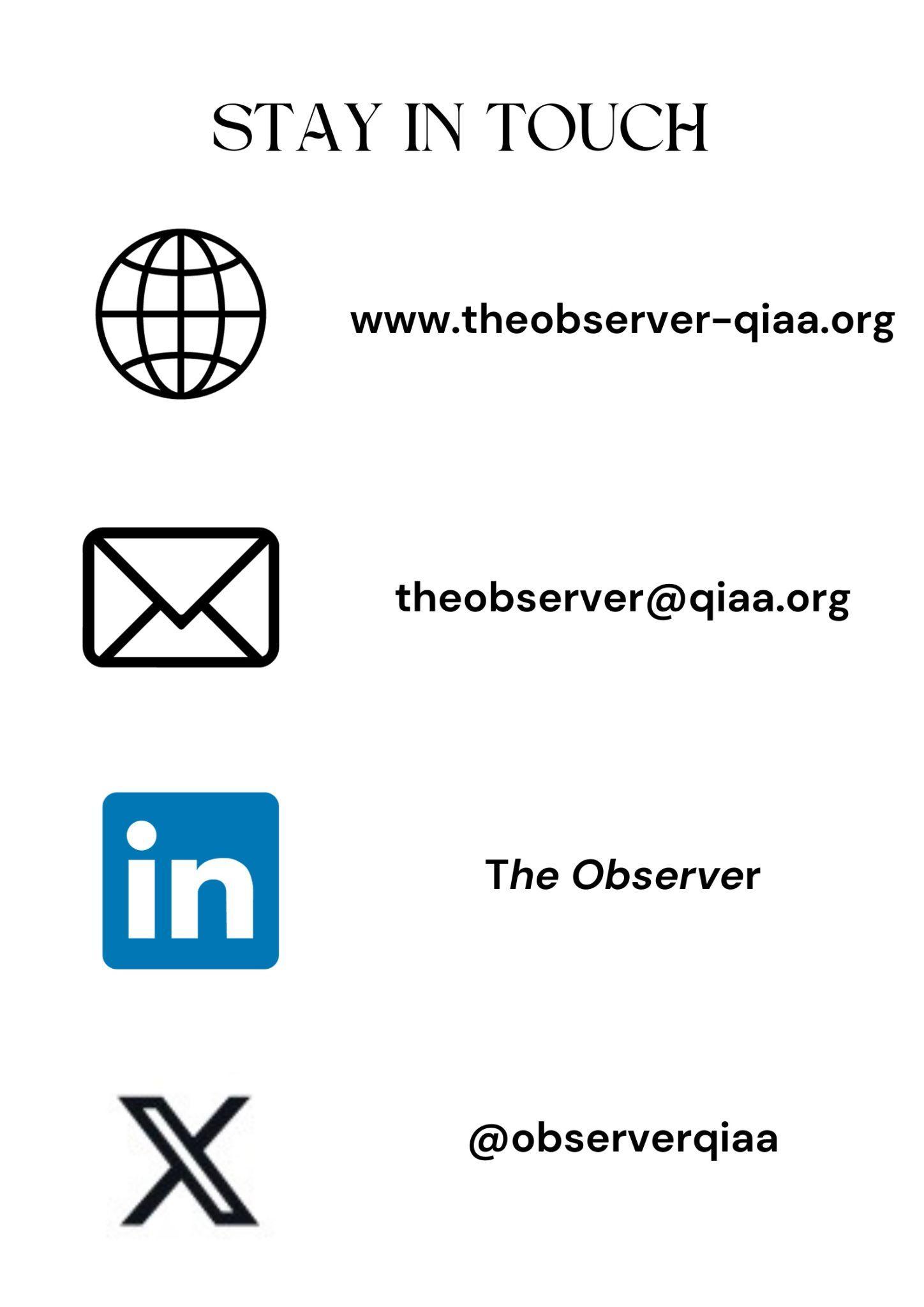
THE OBSERVER XX.1 26.




 by: Caitlin Elrick
by: Caitlin Elrick
 by: Lauren Hood
by: Lauren Hood



 by: Giuliana Iacobucci
by: Giuliana Iacobucci
